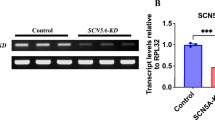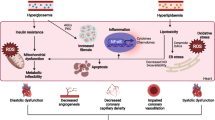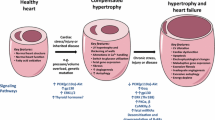In cardiomyocytes, high molecular ATP-dependent HSP70 and HSP90 play an important role in protecting the myocardium from abnormal proteins that appear, in particular, due to activation of oxidative stress. Molecular chaperone HSP60 is of particular importance for cardiomyocytes as it is responsible for assembly of mitochondrial matrix proteins. We studied the peculiarities of expression of HSP60 in left ventricular cardiomyocytes in hypertension, insulin-dependent diabetes mellitus, and their combination. The experiment was performed on 38-week-old male Wistar-Kyoto and SHR (spontaneously hypertensive) rats aged 38-57 weeks. Insulin-dependent diabetes mellitus was modeled by a single parenteral administration of 65 mg/kg streptozotocin. Expression of HSP60 in left ventricular cardiomyocytes was evaluated by immunohistochemical methods. It was found that hypertension, diabetes mellitus, and their combination are associated with a significant decrease in the content of HSP60 in left ventricular cardiomyocytes in comparison with the control. This finding can be considered as a pathogenetic mechanism of myocardial damage induced by hypertension and diabetes mellitus.
Similar content being viewed by others
References
Cömert C, Fernandez-Guerra P, Bross P. A cell model for HSP60 deficiencies: modeling different levels of chaperonopathies leading to oxidative stress and mitochondrial dysfunction. Methods Mol. Biol. 2019;1873:225-239.
De Maio A. Extracellular heat shock proteins, cellular export vesicles, and the Stress Observation System: a form of communication during injury, infection, and cell damage. It is never known how far a controversial finding will go! Dedicated to Ferruccio Ritossa. Cell Stress Chaperones. 2011;16(3):235-249.
Deocaris CC, Kaul SC, Wadhwa R. On the brotherhood of the mitochondrial chaperones mortalin and heat shock protein 60. Cell Stress Chaperones. 2006;11(2):116-128.
Fan F, Duan Y, Yang F, Trexler C, Wang H, Huang L, Li Y, Tang H, Wang G, Fang X, Liu J, Jia N, Chen J, Ouyang K. Deletion of heat shock protein 60 in adult mouse cardiomyocytes perturbs mitochondrial protein homeostasis and causes heart failure. Cell Death Differ. 2020;27(2):587-600.
Juwono J, Martinus RD. Does Hsp60 provide a link between mitochondrial stress and inflammation in diabetes mellitus? J. Diabetes Res. 2016;2016:8017571. https://doi.org/10.1155/2016/8017571
Krause M, Heck TG, Bittencourt A, Scomazzon SP, Newsholme P, Curi R, Homem de Bittencourt PI Jr. The chaperone balance hypothesis: the importance of the extracellular to intracellular HSP70 ratio to inflammation-driven type 2 diabetes, the effect of exercise, and the implications for clinical management. Mediators Inflamm. 2015;2015:2049205. https://doi.org/10.1155/2015/249205
Nakhjavani M, Morteza A, Khajeali L, Esteghamati A, Khalilzadeh O, Asgarani F, Outeiro TF. Increased serum HSP70 levels are associated with the duration of diabetes. Cell Stress Chaperones. 2010;15(6):959-964.
Nguyen VC, Deck CA, Pamenter ME. Naked mole-rats reduce the expression of ATP-dependent but not ATP-independent heat shock proteins in acute hypoxia. J. Exp. Biol. 2019;222(Pt 22):jeb211243. https://doi.org/10.1242/jeb.211243
Noble EG, Shen GX. Impact of exercise and metabolic disorders on heat shock proteins and vascular inflammation. Autoimmune Dis. 2012;2012:836519. https://doi.org/10.1155/2012/836519
Nonaka K, Une S, Komatsu M, Yamaji R, Akiyama J. Heat stress prevents the decrease in succinate dehydrogenase activity in the extensor digitorum longus of streptozotocin-induced diabetic rats. Physiol. Res. 2018;67(1):117-126.
Ranek MJ, Stachowski MJ, Kirk JA, Willis MS. The role of heat shock proteins and co-chaperones in heart failure. Philos. Trans. R. Soc. Lond. B. Biol. Sci. 2018;373:20160530. https://doi.org/10.1098/rstb.2016.0530
Rodríguez-Iturbe B, Johnson RJ. Heat shock proteins and cardiovascular disease. Physiol. Int. 2018;105(1):19-37.
Takayama S, Reed JC, Homma S. Heat-shock proteins as regulators of apoptosis. Oncogene. 2003;22(56):9041-9047.
Tiss A, Khadir A, Abubaker J, Abu-Farha M, Al-Khairi I, Cherian P, John J, Kavalakatt S, Warsame S, Al-Ghimlas F, Elkum N, Behbehani K, Dermime S, Dehbi M. Immunohistochemical profiling of the heat shock response in obese nondiabetic subjects revealed impaired expression of heat shock proteins in the adipose tissue. Lipids Health Dis. 2014;13:106. https://doi.org/10.1186/1476-511X-13-106
Author information
Authors and Affiliations
Corresponding author
Additional information
Translated from Byulleten’ Eksperimental’noi Biologii i Meditsiny, Vol. 170, No. 7, pp. 15-20, July, 2020
Rights and permissions
About this article
Cite this article
Blagonravov, M.L., Sklifasovskaya, A.P., Korshunova, A.Y. et al. Heat Shock Protein HSP60 in Left Ventricular Cardiomyocytes of Hypertensive Rats with and without Insulin-Dependent Diabetes Mellitus. Bull Exp Biol Med 170, 10–14 (2020). https://doi.org/10.1007/s10517-020-04994-4
Received:
Published:
Issue Date:
DOI: https://doi.org/10.1007/s10517-020-04994-4




